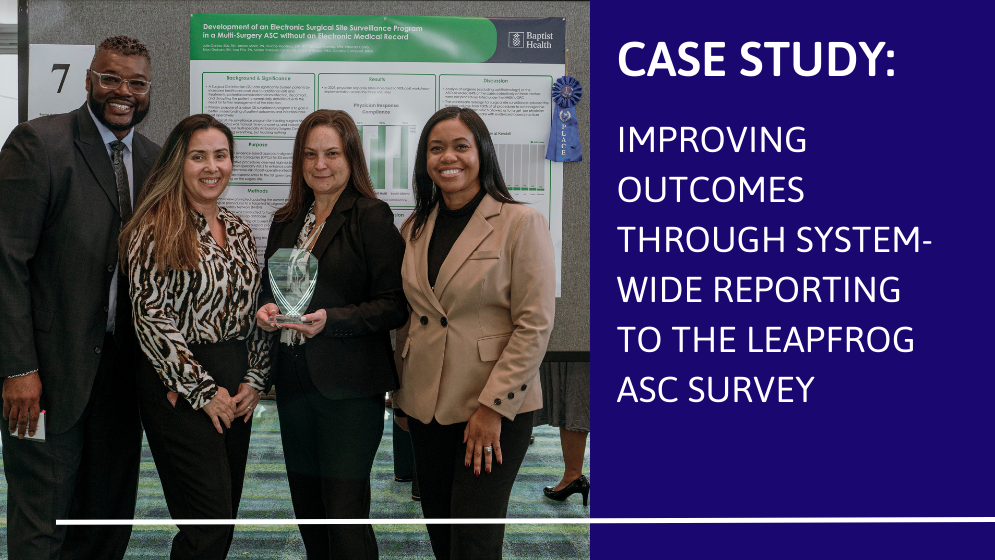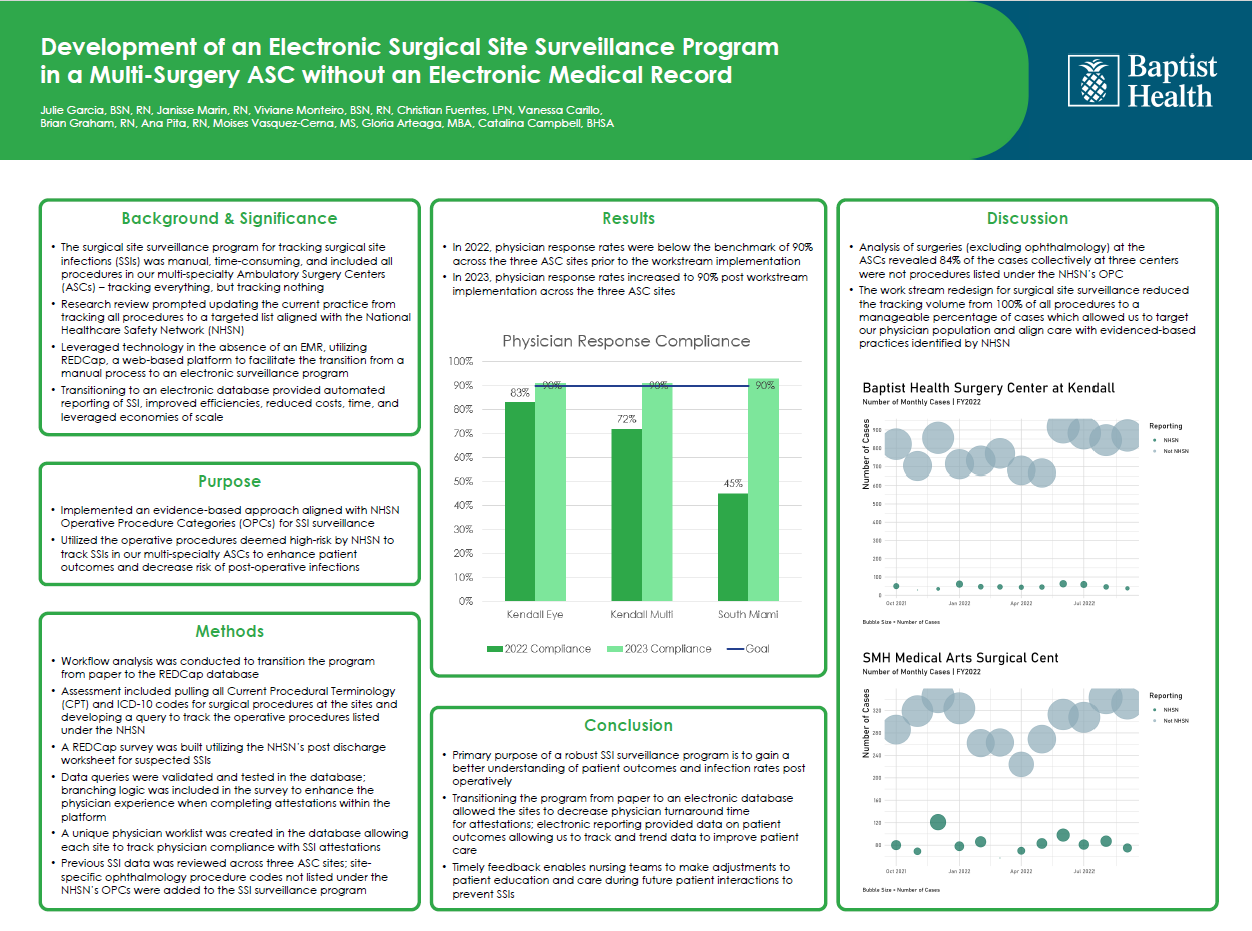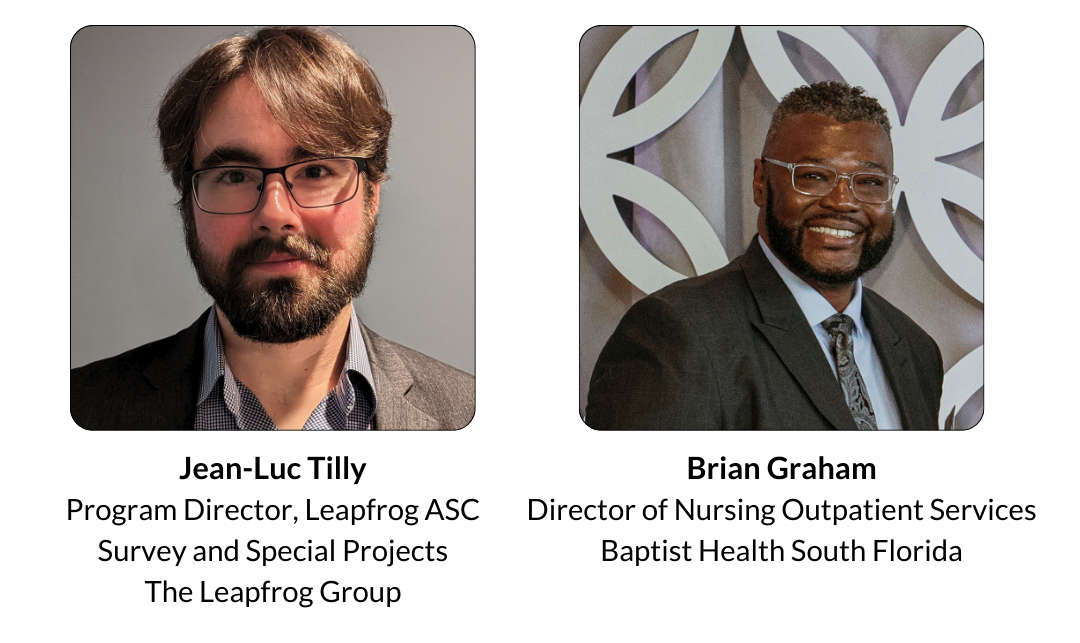
The Leapfrog Group has collected and publicly reported safety and quality information about inpatient care for 25 years through its Leapfrog Hospital Survey. In 2019, Leapfrog launched the Leapfrog Ambulatory Surgery Center (ASC) Survey to expand its data gathering and reporting enterprise to outpatient care. Many ASCs across the country are making continuous improvements to give patients an exceptional level of care and the Leapfrog ASC Survey provides an opportunity to show patients and their communities that they prioritize transparency.
The Leapfrog ASC Survey asks surgery centers about their quality and safety practices including medication safety, infection rates, handwashing and applicable surgical volumes for procedures across 10 different specialties. Results are publicly reported alongside those of hospitals at Ratings.LeapfrogGroup.org. Both the Leapfrog Hospital and ASC Surveys open April 1 annually and are free for facilities to participate.
Baptist Health South Florida has 13 ASCs that report to Leapfrog. In 2024, 13 of their facilities were honored as Top ASCs out of only 34 across the U.S. Baptist Health Outpatient Services was also awarded at the 2024 Leapfrog Annual Meeting’s Poster Session for having the top scoring poster for an ASC.
Click here to expand poster to full screen view.
In this case study interview, Jean-Luc Tilly, Program Director, Leapfrog ASC Survey and Special Projects, at The Leapfrog Group sat down with Brian Graham, Director of Nursing for Outpatient Services, to discuss the benefits Baptist Health South Florida has seen through participation in the Leapfrog ASC Survey.
Jean-Luc Tilly: Hi, I’m Jean-Luc Tilly, Program Director for Leapfrog's ASC Survey, and some other special projects here. I’m joined today by Brian Graham, Director of Nursing for Outpatient Services at Baptist Health of South Florida. Welcome, Brian! Can you tell us a little bit about your day-to-day work and your role in quality improvement at Baptist Health?
Brian Graham: Thank you for having me, Jean-Luc. My day-to-day work involves overseeing outpatient services at Baptist Health, which includes ensuring that we have high-quality patient care across our surgery centers. A big part of my role focuses on implementing and maintaining quality improvement initiatives. My team and I work together to continually evaluate and update our processes based on best practices and data-driven insights we identify internally to ensure patient safety, operational efficiency and overall patient satisfaction. Of course, we want to do the right thing for our patients, making sure we provide great care for them and their families. I also work closely with operational leaders to set manageable goals for quality improvement. We have regular meetings to review and track our progress to ensure we're meeting our internal or external benchmarks.
Jean-Luc Tilly: I imagine that Leapfrog is part of that benchmarking process. What motivated you to participate in the Leapfrog ASC Survey?
Brian Graham: As you all know, Leapfrog initially focused on the hospital side, so we were already participating with Leapfrog, including submitting Hospital Surveys and reviewing our Safety Grades. When the ASC Survey came out, we were very interested.
It gave us a clear, objective measure of how we were performing, focusing on quality and patient safety. It felt natural to participate in the ASC Survey, and we continue to do so. It helps us with transparency and continuous improvement, which is important not only to our patients but also to our staff, physicians and leaders.
Jean-Luc Tilly: Absolutely, it's great to have that data to help facilitate benchmarking. Can you talk about some of the challenges and benefits of participating as a system?
Brian Graham: Of course, there are benefits and challenges to anything, and we’ve encountered some challenges. One of them is the complexity of collecting and consolidating data across multiple locations. We currently have 13 surgery centers, and each center has its unique characteristics. There are some common policies and procedures, so we strive to harmonize them across the system. It’s not always possible to standardize everything, but we can harmonize. By participating as a full system, we benefit from a more unified approach to quality improvement, creating standard operating procedures to ensure consistency in care. There are both benefits and challenges, but we also have the latitude to perform individually as a center while utilizing our system resources to standardize and harmonize things along the way.
Jean-Luc Tilly: That’s great to hear. It’s interesting to think about the individual center approach. When we talk to different ASCs, we hear a lot about how their focus on a given specialty or the geographic area they serve really determines their approach to quality and their mission. How does that factor into your work?
Brian Graham: Every community is different, so the centers are going to function and provide services to meet the needs of their specific community. Since we have surgery centers across three counties, each county has its unique makeup, so how we perform in one county may differ from how we perform in another. It’s all about meeting the community’s needs and listening to what they’re telling us. We adjust as necessary to meet those needs, which is critical.
Jean-Luc Tilly: It was really moving to work with our Patient Family Caregiver Expert Panel on our informed consent standard, because it was such a deeply felt priority for them. We knew it would be a difficult task for organizations to implement, but it’s been amazing to see how many have made it work, including yourself. I’m sure it’s a challenge, especially with the legal language that often appears in consent forms.
Brian Graham: Absolutely. We don’t always get patients who have the same level of education. Some may not have finished high school, while others may have graduate degrees. You have to think about the populations you’re serving. Achieving the 6th-grade reading level standard was challenging, especially given some of the legal terms in consent forms. But ensuring that patients understand what’s happening to them is crucial. By presenting information at a level they can understand, we give them the opportunity to ask questions and better understand the procedures.
Jean-Luc Tilly: I wonder about your process for engaging with your staff—both the day-to-day colleagues you work with and leadership. How do you prepare for the Leapfrog ASC Survey every year? Is it more of a continuous process, or do you start fresh each time?
Brian Graham: It's definitely continuous. We’re always looking at metrics and identifying key data points that need attention. We talk about it all the time, whether it’s in leadership meetings, individual staff meetings or board meetings. We utilize staff meetings, which we call "team connects," to display data and review how we're performing. We have quality educators who help identify areas for improvement, ensuring we meet or exceed our benchmarks. We keep communication transparent at all levels, and we always push ourselves to improve. For example, if our goal this year is a 90% benchmark, next year, we may aim for 93% or 95%. People sometimes question why we push harder after meeting a goal, but without pushing ourselves, we can’t improve. Ultimately, the patients receive better quality care.
Jean-Luc Tilly: That’s a good approach. Just to clarify, when you share this data internally, is it site-specific, or do you also share it at the system level?
Brian Graham: We share it at both levels. It’s site-specific, but at the system level, our CEOs meet with other leadership teams across the organization to share performance. We also have system-wide quality meetings where we highlight different entities. So, we ensure that everyone is on the same page and see how the ASC is doing both individually and within the broader system.
Jean-Luc Tilly: That’s helpful. Now, for centers that are just starting to submit the Leapfrog ASC Survey, do you have any advice for them?
Brian Graham: First, it’s a commitment—not just from the quality team, but from leadership as well. Whether it's executive leadership or physician leaders, their commitment is crucial. Once they’re on board, that’s when the real progress starts. Then, you need a clear understanding of where you stand. Conduct a gap analysis: Where are the opportunities? What do we need to improve? It’s important for leadership to take ownership of this and for the whole team to collaborate. Don’t try to do everything yourself. Involve different departments, divide up tasks, and make the process manageable. Then, it’s about consistently talking about it and making it part of daily operations—not just something that happens once a year.
Jean-Luc Tilly: Great advice. I also wonder about collaboration within the system. Do you have any tips for hospital leaders looking to support their ASCs, or ASC leaders seeking help from hospitals?
Brian Graham: Absolutely. If hospitals and ASCs are part of the same system, there are plenty of opportunities to leverage existing processes. For example, informed consent might look similar on both sides. There’s no need to reinvent the wheel. ASC leaders can reach out to hospital leaders who have already participated in the Leapfrog Survey and ask for guidance. They can compare Surveys and learn from one another, identifying areas that can be standardized. Don’t work in silos. If there’s a process or resource the hospital has used, ask about it. Collaboration is key.
Jean-Luc Tilly: That's great to hear. Thank you so much for sharing all this valuable insight. In closing, is there anything I haven’t asked that you want to cover?
Brian Graham: I have a question which I've asked before. I know on the hospital side of the world, they get Safety Grades. Is the grading also going to come to the ASC world at some point?
Jean-Luc Tilly: That’s an excellent question. We talk about this quite a bit, and we are really interested in finding a way to make that happen. So far, the limitation has been that we don't have enough publicly reported data. The Hospital Safety Grade combines data that’s been submitted to Leapfrog and data that’s publicly reported by the Centers for Medicare and Medicaid Services (CMS) on Care Compare. We don’t have access to that same amount of data from CMS for ASCs, but it’s something we are constantly advocating for. CMS has just added new publicly reported outcome measures to the Ambulatory Surgery Center Quality Reporting Program (ASCQR) that we are going to incorporate in the ASC Survey, to save facilities time who had been reporting those data through NHSN. I hope that with additional measures in ASCQR, and more participation in Leapfrog’s ASC Survey, we will be able to get to an ASC Safety Grade. For the time being, we are holding back from giving an ASC Safety Grade out of respect for the great work surgery centers do. We don’t want to be in a position of giving facilities grades they don’t deserve because of limited data availability. We want to make sure it’s fair.
Brian Graham: That’s good news. We appreciate that!
Jean-Luc Tilly: I’ll add that we recognize the Hospital Safety Grade has been transformational on the hospital side. There’s something about being able to summarize a lot of what can be, even for practitioners, an overwhelming amount of quality data. The way that data is publicly reported is definitely not at a 6th-grade reading level! By simplifying the data and offering a single letter grade, I think the Safety Grade has really accomplished something pretty special. I think it could be really great on the surgery center side.
Brian Graham: We’ll be waiting.
Jean-Luc Tilly: You'll certainly have the opportunity to provide feedback before we proceed. There will be a thorough public comment process, and we look forward to your input. Thank you again for taking the time to speak with me today. This has been incredibly informative for me, and I hope it will be valuable to others as well.
Brian Graham: Thanks so much for the opportunity. We really value the Leapfrog ASC Survey and the work you do.


